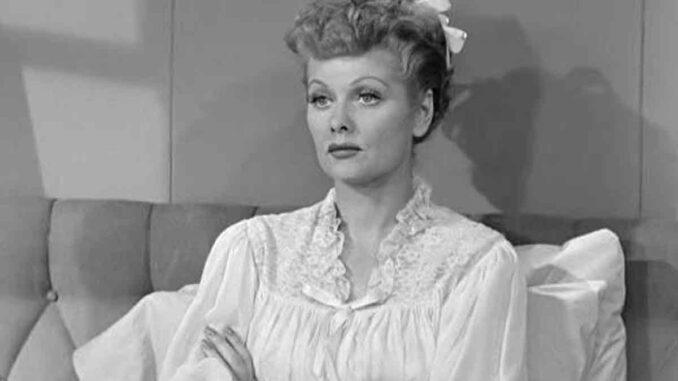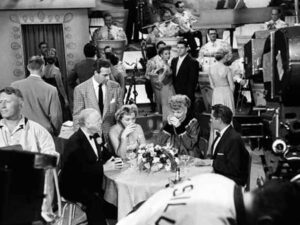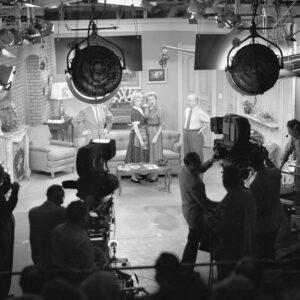
Introduction: The Untold Story of Lucille Ball’s Emotional Breakdown
Lucille Ball is remembered for her impeccable comedic timing, her vibrant energy, and her ability to turn every moment on I Love Lucy into something unforgettable. However, behind the bright lights and slapstick humor, there was a different side to the show—one that involved stress, change, and at times, even tears.
In a particularly shocking behind-the-scenes moment, Lucille Ball found herself in tears due to an unexpected change on the show. This incident reveals not only the pressures of being a trailblazer in television but also the human side of an iconic star who was far more than the zany, lovable Lucy Ricardo. Let’s dive into this emotional moment and what it meant for Lucille Ball and the show.
Lucille Ball: The Heart and Soul of I Love Lucy
Before we explore the pivotal moment that brought Lucille Ball to tears, it’s important to recognize just how much I Love Lucy meant to her. As one of the first sitcoms to truly break barriers for women in television, Lucille was not only the star but also the force behind the show’s success.
- Lucille Ball was not only the face of the show but also a producer, often involved in every decision about the direction of the series.
- She faced significant challenges as a female producer in a male-dominated industry, often balancing her work as a mother and wife with the demands of her career.
The pressures of her multifaceted role were immense, but Lucille was determined to make I Love Lucy a success—not just for herself, but for everyone involved.

The Show’s Groundbreaking Nature: Paving the Way for Women in TV
By the time I Love Lucy became a cultural phenomenon, Lucille Ball had already established herself as a comedian, but the show itself was groundbreaking. It brought:
- Innovative production techniques: I Love Lucy was one of the first shows to be filmed in front of a live studio audience, creating a more authentic feel to the sitcom format.
- A different kind of leading lady: Lucille Ball’s character, Lucy Ricardo, was not the typical 1950s housewife. She was impulsive, adventurous, and always involved in wacky situations that made the show a hit.
While the show’s success was undeniable, this was also when the cracks started to show—leading to the emotional moment that would leave Lucille Ball devastated.
The Incident That Brought Lucille Ball to Tears
So what exactly caused Lucille Ball to break down in tears? It all started with a significant change in the way the show was being run. The shift in direction came from an unexpected decision by CBS, which would ultimately affect the entire cast and crew.
A Change in the Crew: The New Director’s Vision
In the mid-1950s, a new director came on board to help revamp the show. While directors have always been an integral part of a television production, this particular change was not something Lucille was expecting or prepared for. The new director, who had a vastly different approach to comedy, made adjustments that didn’t sit well with Lucille.
- The tone of the show shifted, moving away from the more physical slapstick humor Lucille excelled at.
- Lucille’s personal input as both star and producer was reduced, which led to a sense of alienation for the woman who had brought I Love Lucy to life.
As the show was evolving, Lucille realized that she was losing control over the very thing that she had worked so hard to build. The new direction was jarring, and in a rare moment of vulnerability, Lucille expressed her frustration, breaking down in tears.

Why the Tears? A Deep Emotional Struggle
Lucille’s tears were not just about a creative difference or a change in leadership—they were about the overwhelming pressure of living up to her own expectations and the expectations of a nation.
The Weight of Responsibility
Lucille’s immense popularity had placed an enormous weight on her shoulders. As a producer and lead actress, she felt a deep responsibility to her team, her audience, and herself.
- The pressure to perform: Lucille had created a phenomenon that everyone expected her to maintain. She was not just playing a character; she was carrying the success of an entire production.
- Feeling unheard: The decision to bring in a new director without consulting her was a blow to Lucille’s sense of control. She had become so involved in the production that being left out of key decisions made her feel sidelined.
The emotional breakdown stemmed from a place of deep personal connection to the show and its crew. Lucille wasn’t just upset about the change—it was the realization that things would never be the same again.
The Aftermath: How Lucille Ball Managed the Change
Despite the emotional turmoil she experienced, Lucille Ball proved her resilience. She found a way to navigate the situation, eventually reclaiming her role as both the star and the driving force behind I Love Lucy.
Reasserting Control
Lucille’s response to the behind-the-scenes change was to take charge once again. She found ways to work closely with the director and make adjustments that aligned with her original vision for the show.
- Fostering collaboration: She worked alongside the new director to create a balance between his vision and her own comedic style, ensuring that the essence of Lucy Ricardo was preserved.
- Personal growth: The experience taught Lucille valuable lessons about handling adversity and maintaining her role in the industry despite the challenges.
Her ability to bounce back from this emotional setback made her even more respected within Hollywood, proving that her strength extended far beyond the screen.
The Impact on I Love Lucy: A Show Forever Changed
The behind-the-scenes shift was more than just a change in personnel—it marked a pivotal moment in the evolution of I Love Lucy. While the series continued to be a monumental success, the incident served as a reminder that even the brightest stars face moments of vulnerability and doubt.
Lucille Ball’s Legacy
Despite the tears and struggles, Lucille Ball’s legacy remains untarnished. She not only changed the landscape of television but also redefined what it meant to be a woman in Hollywood.
Her emotional moment on set was just another testament to her commitment to her craft and her desire to make the best show possible.
Conclusion: The Human Side of an Icon
Lucille Ball’s behind-the-scenes emotional breakdown is a powerful reminder that even the most iconic figures face moments of doubt, frustration, and vulnerability. While she may have shed tears over a creative shift, she emerged stronger, more determined, and more respected than ever before. I Love Lucy may have been the epitome of fun and laughter, but for Lucille Ball, it was also a challenging and deeply personal journey.
FAQs
1. What caused Lucille Ball to cry on the set of I Love Lucy?
Lucille Ball’s emotional breakdown was a result of a significant behind-the-scenes change in the show’s direction, particularly the introduction of a new director whose vision conflicted with Lucille’s own.
2. How did Lucille Ball cope with the creative changes on I Love Lucy?
Lucille Ball managed the change by working closely with the new director, finding a compromise that allowed her to maintain creative control while incorporating the new director’s ideas.
3. Did the change in direction affect the quality of I Love Lucy?
While the show did experience some adjustments, I Love Lucy continued to be successful and remained beloved by audiences, with Lucille Ball ensuring the integrity of the show was preserved.
4. What was Lucille Ball’s role on I Love Lucy besides acting?
Lucille Ball was also a producer of I Love Lucy, making key decisions about the show’s direction, which is why the creative shift affected her so deeply.
5. How did Lucille Ball’s emotional moment impact her legacy?
Lucille Ball’s emotional vulnerability showcased her strength and resilience, adding depth to her legacy as a trailblazer in television who could navigate both personal and professional challenges.